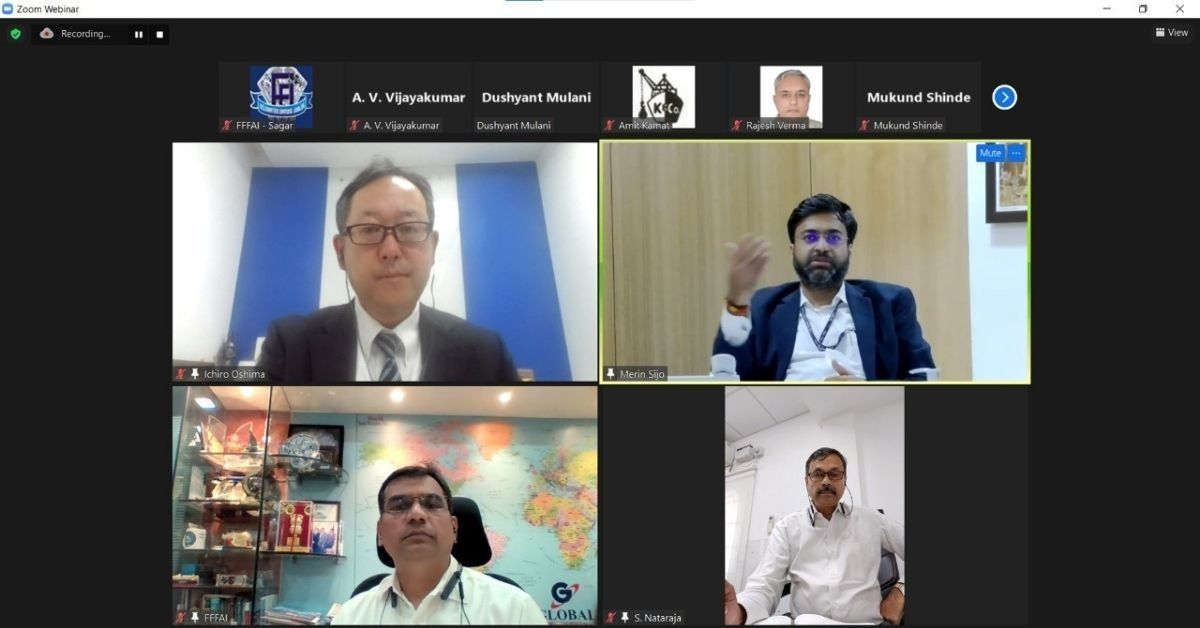On March 29, 2022 FFFAI organized a virtual meeting with representatives of National Industrial Corridor Development Corporation Limited (NICDCL) Logistics Data Services Limited (NLDSL) to understand the implementation of Unified Logistics Interface Platform (ULIP) and how it would benefit FFFAI members and stakeholders. The objective of this meeting was also to support in implementation of this System which is of National interest.
The virtual meeting was addressed by Mr Shankar Shinde, Chairman, FFFAI; Mr Dushyant Mulani, Chairman Elect, FFFAI; Mr AV Vijayakumar, Immediate Past Chairman, FFFAI; Mr Abhishek Chaudhary, Vice President, Corporate Affairs & Company Secretary, NICDCL; Mr Ichiro Oshima, Associate Vice President, NICDCL and other dignitaries. The meeting was attended by the representatives of all 28 Member Associations of FFFAI from across the country.
ULIP is designed to enhance efficiency and reduce logistics cost in India by creating a transparent platform that can provide real time information to all stakeholders and remove all asymmetry information.
ULIP is being developed as technology platform in the logistics sector which will provide real time information to all stakeholders and will converge visibility of multi-modal transport across the existing systems of various Ministries/Departments working in silos. Once completed, one can see huge efficiencies in the logistics sector, and which will transform it by bringing down the logistics cost and enhancing India’s competitiveness in the global trade.
ULIP is also in line with the overall objective of PM GatiShakti which aims at breaking of individual silos, promote integration among various Ministries/Departments and promote real single window. It will bring more transparency and visibility to the whole trade making India logistically more efficient and competitive.
In his opening remarks the FFFAI Chairman said that as of now the logistics industry stakeholders are working in silos. According to him, ULIP would be the much-desired solution for the betterment of this industry. He congratulated NICDCL for their endeavour, which is mandated by NITI Aayog. “We really require sufficient and appropriate data integration among us on different areas of multimodal modes, challenging areas, etc to strengthen the logistics operations/industry in India to global standard,” he said.
Earlier Mr Dushyant Mulani, while welcoming the speakers and participants stated that the topic of the meeting (Integration of ULIP with FFFAI) is very vital in today’s scenario where digitization would be the logical end of the core of the logistics activities, and ULIP is completely focused on this aspect. It would integrate all the said activities under a single platform through effective technologies. Accordingly, with a solid data base it would be able to recommend effective solutions to strengthen the logistics industry from all aspects.
Mr Chaudhary elaborated on the activities of NICDCL as regard to integration of Logistics Data Bank (LDB) project which include RFID tagging for container on entering Indian territory till exit; Integration of all toll plaza tracking of cargo/ vehicle movements, Tracking of Vehicle movement through fast tag and other RFID / QR scan readers and Empty yards inventory of containers.
He focused his presentation on the following points: Potential role of digitalization; Utility of the LDB system and container tracking services; Understanding of the recent trends and emerging requirements in the EXIM logistic segment; How infrastructure at CFS/ICD can be better utilized for the benefit of trade; Digitization of procedures, abandoned and detained containers and Cargo regulations and inspection procedures.
According to Mr Chaudhary, ULIP is the further extension of the LDB project. “It is primarily the software intervention of PM GatiShakti that includes multimodal connectivity and physical infrastructure. ULIP is PM GatiShakti 2.0 bringing in different ministries and stakeholders including Customs ICEGATE under one technology platform,” he added. Mr Chaudhary pointed out that the logistics sector is the backbone of economic growth in India and is one of the most important accelerators of trade, which is also critical for fulfilling the objective of Aatma Nirbhar Bharat. The Government of India’s focus on Logistics connectivity have accelerated measures for infrastructure development and it would leverage logistics through technology implementation. ULIP phase I is focused on data integration and Phase II would be focusing on single documentation for the benefit of the end-to-end logistics segment.
Following ULIP benefits were unveiled in the Union Budget by the Finance Minister of India:
• All mode of operators shall be brought under one Interface through API.
• Ensure effective movement of goods, reducing logistics cost and time.
• Assist Just in time inventory management and eliminate tedious documentation.
• Provide real time information and improve international competitiveness.
• The platform will be an open source technology stack.
Presenting details of the function of ULIP he expressed optimism that with support from CBs/FFs collectively the logistics cost can be reduced and thereby foreign trade can be increased significantly. Mr Choudhary invited private players to join ULIP and share more ideas. Meanwhile, the Government has launched Logistics Hackathon (“LogiXtics”) to crowdsource ideas to benefit logistics industry. He also shared that the ULIP phase I will be formally implemented/will go live by April 2022.
The meeting was very interactive with Q-A session participated by FFFAI Office Bearers and Members. Mr Shinde and Mr Vijayakumar raised the issue of lack of data pertaining to time release study and dwell time which affects the overall logistics cost. Mr Chaudhary assured that this aspect would be taken care of in the Phase II of ULIP. Mr S Nataraja, Vice Chairman, FFFAI proposed the vote of thanks to all panel speakers and participants to make the interactions very insightful.







